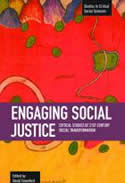Latest Editorials
Old Wine, Old Bottles
David Fasenfest, Critical Sociology, 39(1), 2013
We have just finished a marathon election season, almost two years in the making, and by all accounts billions of dollars spent (almost $3b by the candidates, altogether about $6b by all the various campaigns and PACs formed to promote one candidate or another), to arrive at the same place. We might be excused if we glance at a British system that holds its elections in 3 weeks and bans television advertising – after all, we are hard pressed to see how that results in very different outcomes in governing styles and political philosophies. Little has changed in the US political landscape: stubborn right-wing Republicans, wary of Tea Party primary challenges, retain control over the US House of Representatives, while Democrats and their uneasy neoliberalism remain entrenched in the US Senate. President Obama was re-elected and, depending on whose tea leaves one consults (certainly not the Tea Party's), it was a resounding victory for a continuation of his policies, or a narrow victory by a President with a less than stellar record in office over an elitist and even more unappealing opponent. After all, fewer than half the eligible voters chimed in by voting, so a case can be made that the electorate was not enthusiastic about its choices....
Political Leadership and Social Transformation
David Fasenfest, Critical Sociology, 38(6), 2012
We are in the midst of a national decision (some might argue it is a sham, others that the choices are only by degree and not of great substance) on who should be the next President of the United States. Debates on the left vacillate between arguments that it does not matter who is elected since the two parties in this country, Democrat and Republican, represent competing wings of the same ruling strata. Others argue that the differences, however subtle, matter on the margins determining which social policies are implemented and what sort of foreign policies are pursued. In this round of 'is Obama a progressive' debates several key issues keep coming up....
Where Will Change Come From?
David Fasenfest, Critical Sociology, 38(5), 2012
In a recent editorial in the New York Times (New York Times Editorial, 2012), rising income inequality and the unbalanced debt burden are identified as the reason our economy is struggling, and why (by implication), unless this situation is remedied, austerity measures are destined to fail. Clearly, this revelation does not come as news to an Occupy Movement that, if nothing else was accomplished (and we can argue there are other important outcomes), raised in the minds of most people the questions of who has and who does not have wealth, how is this inequity fueled, and what can we do to address this severely unequal income distribution. While some bumper stickers report a 425:1 ratio of average CEO to average worker salary, recent research does provide a sobering picture of 325:1 in 2010 (almost returning to the pre-2008 meltdown level of 344:1, see Anderson et al., 2011: 3). Before this movement began, the main topic of political discussions and water cooler conversations focused on two questions: How large was the deficit? What must we do to eradicate our debt? Now, a majority of the people in this country agree that inequality is a major, if not the main, problem to be addressed and rectified. But, as a friend in California writes me, if the editorial board of the New York Times now says ending income inequality is long overdue then 'the system' must truly be scared....
Racial Politics and the Right
David Fasenfest, Critical Sociology, 38(4), 2012
As the country was engaged in a primary campaign that pitted Barack Obama against Hillary Clinton, many saw it as a battle between the candidate of a progressive, post-racial America and the representative of the traditional political forces that had defined the Democratic Party for decades. The fact that this country was at a political watershed was self-evident because the two leading candidates for their party's nomination were a person of color and a woman, two constituencies that had been (and continue to be) the mainstay of Democratic Party electoral support yet had never appeared at the top of the ticket (or, with the exception of Geraldine Ferraro, anywhere on the ticket) for national office. This was indeed a major change in the political and social landscape of the country....
Globalization and its Discontents
David Fasenfest, Critical Sociology, 38(3), 2012
In this issue of the journal, William Robinson offers his analysis of the rise of transnational elites emerging outside of the traditional frame of nation-based capitalism. What is significant, in large part, is that unlike their national-capital predecessors, this new cadre has little concern for all that we refer to as social reproduction, industrialization, and local development. In its place, argues Robinson, are elites guided by a definition of global development rooted in the expansion of global markets and the integration of national economies into a global capitalist reality....
The Importance of a Perspective from Abroad
David Fasenfest, Critical Sociology, 38(2), 2012
Even the most isolationist persons among us cannot help but be aware of how connected we are to the rest of the world, and for a moment recognize that perhaps we cannot disassociate ourselves from the global political economy. Aside from the endless noise about how we live in a globalized economy, and talk of financial markets bouncing up and down in time with the ebbs and flows of the economic news from Europe and the eurozone, as a rule we have little idea about how the rest of the world understands events as they pertain to the USA...
The 21st Century Urban Landscape: Plus ça change
David Fasenfest, Critical Sociology, 38(1), 2012
In his account of the turbulent decade of the 1960s, in which New York City dealt with endemic corruption, racism and economic distress, English begins by telling us "(u)ntold thousands, perhaps millions, have fallen prey to the perils of municipal dysfunction, to the growing pains of a city forced to adjust to violent demographic shifts, internal hostilities, wrenching social changes…(2011: xi)." It is a description that those of us who lived through that decade in that city would find neither unfamiliar nor surprising...



